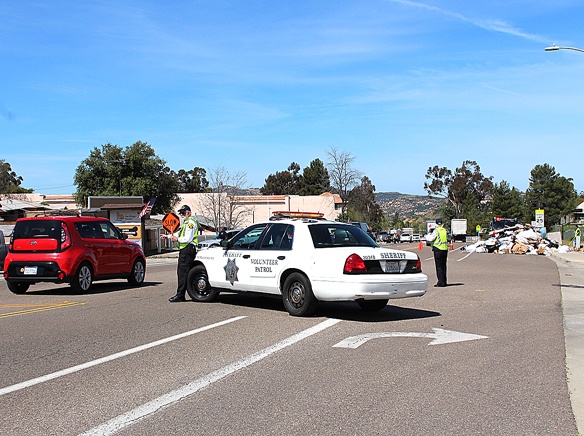
According to San Diego Deputy Sheriff Sgt. Kelly Moody, most members of the Retired Senior Volunteer Patrol did not have a background in law enforcement prior to serving with the sheriff’s department but joined up upon retirement as a way to give back to their community.
To wear the badge, volunteers have to pass a two-week patrol academy course and be physically and emotionally able to perform the duties of the position.
“They’re taught by deputies, trained in things like how to talk on the radio. It isn’t overbearing but definitely structured toward making them successful,” Moody said.
According to the Sheriff’s department, some general topics covered include crime prevention, CPR/AED safety, and basic traffic control. Moody explained that each participant receives that standardized training before learning information specific to the neighborhood in which they will be working.
For example, RSVP participants in Alpine are specifically trained to perform You Are Not Alone (YANA) welfare checks on senior residents in the community that Moody says used to fall to deputies in addition to their usual duties.
Moody says the RSVP program has lightened their load and provides vital services to the community.
“I personally have seen them save people’s lives because they contacted emergency personnel when someone was in distress that might otherwise have gone unknown,” Moody said.
Alpine RSVP Administrator Robert Marquart had never served in law enforcement when he joined RSVP in 2012. He said the training was filled with new information for him but was not difficult to complete. He now works with an active base of 20 volunteers in Alpine who are often utilized for traffic control in any situation that requires a traffic diversion, from an accident to a homicide to a burglary.
“We do all sorts of things from traffic diversion to running paperwork to the courthouse. We free up the deputies,” Marquart said.
In addition to senior welfare checks, the team also performs vacation checks upon request, making sure doors and windows are secure from break-ins while residents are away from home.
“We’re really blessed to be a crime-free community in Alpine, our deputies do a great job,” Marquart said.
Volunteer Judy Prevatte said that during the 2018 West fire, she and other volunteers diverted traffic at the epicenter of the fire on Willow Road for a full shift to ensure that residents were able to safely access evacuation routes, then returned to the scene afterward with flats of water for subsequent volunteers as well as on-duty firefighters.
“It was 111 degrees, blistering hot, the smoke was incredible and it was a tough day for all the first responders but we really felt like were doing something for our community,” Prevatte said.
The team also spends time on local campuses, doing what Marquart calls “flying the flag,” maintaining a visible presence to schoolchildren while interacting with administrators and walking around campus as a liaison to the sheriff’s department.
Joan MacQueen Middle School Administrator Laura Garbani said that they are an extraordinarily helpful group to have on campus.
“They’re super friendly, great with the kids, they offer a ton of support with after-school events,” Garbani said.
Marquart said that the program sustains 500-600 volunteers at a time in San Diego county, and is probably one of the premiere programs in the nation.
“Other states have had various sheriff’s departments in their states, Texas and others, look at what we’re doing,” Marquart said.
He also said that internal hourly productivity tracking programs indicate the group has saved the county approximately $4 million by utilizing volunteers.
Interested volunteers can call (619) 659-2600 for more information from the Sheriff’s department.












